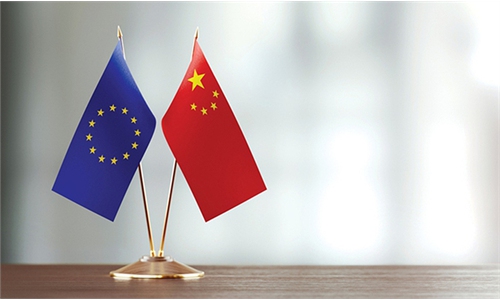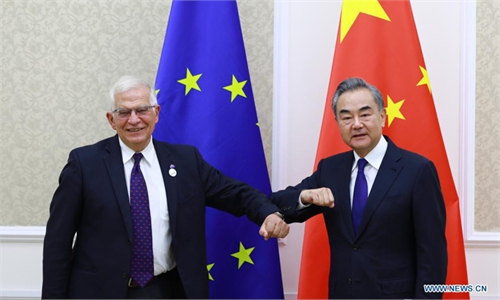The European media has fallen into the trap of the American narrative: Author of 'The Sanctimonious Superpower'

Michael Luders Photo: Courtesy of Michael Luders
Editor's Note:
China's Foreign Ministry Spokesperson, Hua Chunying, recently introduced the book Die scheinheilige Supermacht: Warum wir aus dem Schatten der USA heraustreten müssen (or The Sanctimonious Superpower: why we need to step out of the US shadow) at a regular press conference. The book points out that America's adherence to "values" is only one side of the coin; the other side is brutal power politics. Since WWII, the US has overthrown many progressive governments with no moral scruples. The book also uses numerous examples to deeply expose how the US manipulates world public opinion through media and institutions, while the European media is deeply embedded in the discourse hegemony of the US and has lost the ability to think independently. The book immediately became a hit after its release this year. Global Times reporter Qing Mu (GT) had a conversation with Michael Luders (Luders), author of the book and a renowned Middle East expert.
GT: In your latest book, The Sanctimonious Superpower: why we need to step out of the US shadow, which has garnered lots of attention, why did you describe the US as sanctimonious?
Luders: The US is a world power that claims to act in the name of freedom, democracy and human rights but there is a wide gap between ideal and reality. During the Cold War, the US proved that on every continent its claim to power was against the will of the local people. In Latin America, Washington supported far-right military dictatorships. In Indonesia, there was a military coup in 1965 against socialist president Sukarno. Later, under the leadership of his successor, many left-wing opponents were suppressed. On September 11, 1973, a coup against left-wing president Salvador Allende happened in Chile. The US actively supported these incidents behind the scenes.
The US is sanctimonious because while it always cites higher values, in reality it pursues a kind of power politics that is tough and cold-blooded. It's reference to "higher values" is being manipulated. For example, the US government and its European allies have complained about the Russian government's treatment of Russian dissident Alexei Navalny. Meanwhile, Washington relentlessly persecutes whistleblowers like Edward Snowden or Julian Assange. It would be hypocritical for the US today to demand "human rights" from Russia or China, rather than from its allies. The US only measures other countries by two different standards: the good guys, the West and its allies; and the bad guys, Russia and China, the geopolitical rivals of the West.
GT: Why are European media outlets aligned with the US in their judgment and values in terms of international politics? What adverse consequences will this have on Europe?
Luders: There are many means by which the US can influence European public opinion. The most effective way is to divide the world into "good guys" and "bad guys," as already mentioned. Most importantly, the US has positioned its political and economic rivals, Russia and China, as the "bad guys". Whatever the political leadership there does or does not do, it is always interpreted as wrong and a threat to freedom and democracy.
As a result, objective coverage of China or Russia by the Western media is very rare. For example, they see the Belt and Road Initiative (BRI) as an attempt by China to weaken and infiltrate the West. China is seen primarily as a "threat" rather than an economic or political partner.
GT: Do you think German media are blindly following the US in their reports on China? What traps will they fall into if they just follow the US?
Luders: The US is a declining world power and China is a rising world power. US foreign policy has pursued this goal above all, that is, to put China and Russia under economic, political and military pressure to maintain US hegemony. This is not stated publicly, but it does influence Washington's actions. The US wants its European allies to join its actions. Their official rhetoric is that democracy must oppose authoritarianism.
Most of the media in the US and Europe follow this confrontation logic. However, surveys show that a majority of Germans and Europeans disagree with it. They want Europe to take a neutral position and have good relations with the US and China.
GT: After Joe Biden took office there was a sense of blind optimism and relief in Europe. How will this influence European media? Do you think that Biden will continue to put "America First"?
Luders: Biden behaved politely and looks like he is open to the Europeans. However, he is still taking the "America First" approach.
Washington made calls to the European Union to reduce trade with China and take firm action against Beijing and Moscow. At the same time, Washington has persuaded NATO to show its military presence in the Indo-Pacific region. Many Western politicians or opinion leaders take it for granted that Western warships should be sent there. On the contrary, if China raised the idea of sending aircraft carriers to the Mediterranean, it would be seen as an act of aggression. Under the US double standards, "good guys" can do a lot of things, and "bad guys" can do a lot less.
GT: Do you think that Europeans can rise above the shadow of American opinion? What changes do you think should be made?
Luders: EU policy makers generally believe that the US, as a NATO partner, is something they need to rely on, especially in the military field. However, there are also divisions within the EU. France wants more autonomy from the US and has called for a defense alliance in which Europe, rather than the US, should play a decisive role. However, Germany is adamantly opposed.
However, with the exception of the Greens, all parties represented in the Bundestag understand that China is becoming increasingly powerful economically and that both Brussels and Berlin depend on good relations with Beijing. This explains why the final statement at the recent G7 summit in the UK in June was very general. Washington wants Europeans to associate their economic ties with China with "progress in democracy and human rights." But they didn't do that. There is a hardline faction within the EU that rejects closer economic and political ties with China. But there are also very powerful economic departments in Brussels and Berlin which are well aware that the economic relationship with China will become increasingly important for Germany and Europe in the coming years.
GT: Can you tell us more about what are the issues where you think the US is making unreasonable accusations against China? What is the intention of the US in accusing China?
Luders: Under Donald Trump, the US started to see China as an "evil empire". The US media and others are using topics including the Wuhan lab-leak theory, Xinjiang and Hong Kong to denounce China. It is often not about objective and reasonable criticism but about demonization. This creates an image of the enemy and makes it easier to take political action against Chinese competitors such as Huawei.
GT: Recently, the US and other Western countries stirred up the Wuhan lab-leak theory. What do you think of this accusation made by the West?
Luders: I'm not a virologist and I can't tell what caused the origin of the coronavirus. But it is suited as a means to put chains on China.
GT: We have seen the EU getting closer to the US in recent months over the alleged "human rights" issue in China. The EU even imposed some sanctions on China. What do you think these mean for the future development of China-EU relations?
Luders: I do not recommend that the EU follow the US line of confrontation with China. The EU has a legitimate self-interest in maintaining good relations with China at all levels.
The world does not need a new cold war. This century will be the century of China and it is naive for the political representatives of 440 million Europeans to think that they can write the rules of the game for an emerging economy of 1.4 billion people. Constructive politics and diplomacy begin with equal treatment. The "white man" era is coming to an end. Perhaps China does have shortcomings, just as political developments in the US and the EU also have shortcomings but shouting in the square will not solve the problem.
GT: How do you think China should respond to the attacks in public opinion from the US and its Western allies?
Luders: China's reliance on soft power will be important in the coming years, for example, trying to get a foothold in Western markets through its film industry. China needs to project a different image from the one that prevails in the West.
It is important to deepen cooperation at the academic level and simplify visa procedures as much as possible in order to let the world understand China's diversity and openness. Since the end of WWI, for more than 100 years, the US has engaged in intensive public relations with Europe and has tried, especially with the help of transatlantic political and media networks, to win over the public. This "networking" is very important and it is a big challenge for China.



